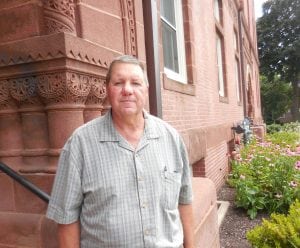WESTFIELD – City Engineer Mark Cressotti characterized his budget as “bloody” to the Finance subcommittee on June 17. “In most cases it’s level funded, in some, reduced,” he said.
Regarding construction or improvements to infrastructure, Cressotti said his request had already been reduced by $2.2 million. “At least it’s something to work with,” he said, adding that the city is hoping that the state will increase Chapter 90 this year to $300 million, an increase currently being discussed. Cressotti said the level should be $500 million.
Council President Brent B. Bean II asked Cressotti if lowered oil prices will help the city to get more for its money.
“Oil prices affect construction considerably. We haven’t seen them go down in bids yet,” he said, adding that bids will be opened next week. He said due to the changes in ownership at Lane Construction, and the fact that a competitor owns the quarry, it may bring competitive pricing.
At-large Councilor Dave Flaherty said that less than a year ago, the Engineering Department did a study that said Westfield needs $75 million worth of road work, $5 million a year over 15 years. He asked if there is any realistic plan to fix the roads, and if not, why spend money on plans.
“The plan is that there is no plan. The study identified that we need $4 million a year. We did submit $3 million in construction with the additional $1.2 million in Chapter 90, but we have been reduced to $700,000. We may get another $600,000 from Ch 90, which would bring us to $2.5 roughly. The game plan is to do the best we can, according to what we can do for the longest longevity and to address the worst issues outstanding,” Cressotti. He added that some of the roads on the construction ilst were able to advance with this year’s funding.
“Every one of you that I see on this screen keeps promising people that the roads are the priority. Yet year after year, we pass the buck; and yet find money for other things. We need to come up with a realistic plan to fund it,” Flaherty said, adding that on the state side, everyone wants money for the state. “We keep promising people this stuff and we’re not delivering.”
The budget was approved as presented, with Flaherty voting no.
Public Works Superintendent David Billips and Assistant Superintendent Francis Cain presented the budgets for all of the departments under Public Works.
Billips said the 2 percent increase in the administrative budget include salaries for himself, Cain and the stormwater coordinator. At-large Councilor Nicholas J. Morganelli Jr. asked if the raises were negotiated STEP increases. Billips said they were mostly city-wide cost of living increases. The budget passed, with Flaherty and Morganelli voting no.
The Highway Department’s budget is a little down, Billips said, with the mayor cutting additional capital equipment. He said most other items are untouched, with an additional item for boots. He said the construction account of $400,000 for road repair and maintenance is untouched. The budget was approved, with Councilors Flaherty and Morganelli voting no.
Billips said the Snow & Ice remains at $400,000, which is the same every year, because on this item the city is allowed to deficit spend. In response to a question from At-large Councilor Kristen Mello, he said the actual costs run from between $1.1 to $1.2 million in a good year, and $1.7 million in a bad year. The budget passed, with Flaherty voting no.
Billips said the Waste Collection budget is down $27,000 due to removal of a position that has been unfunded for a couple of years. He said there is $88,000 budgeted for a trash truck rental which costs $70,000 to purchase, so that line item will be reduced by $18,000. He said the big ticket item is trash, at $1 million a year.
Flaherty asked with the trash changes, whether there is a conversation going on in the trash world about charging fees because of increased costs.
“In a perfect world, we shouldn’t be in the trash business,” Billips said, adding that were the city to privatize, the cost for trash collection would increase from $80 a year to $200 a year. He said Twiss Street is an attractive site with a rail spur for businesses, but the city has not been able to be permitted enough to go forward. He said they might be able to generate revenue there in the future.
Flaherty said there is no state law requiring Westfield to offer the service.
“I’m a big proponent of curbside trash pickup. Twiss Street would in fact generate revenues if you would privatize that portion,” said At-large Councilor Richard K. Sullivan Jr.
“If we went private, wouldn’t private companies be having the same problems with recycling,” asked Ward 6 Councilor William Onyski. .
Billips said recycling is volatile, and the budget had to be increased by $400,000 after paying nothing previously.. He called it a very difficult situation that every Western Mass. community is going through.
“Our trash fee is low in my opinion, Any talk about raising that fee?” asked Bean.
Cain said there are some issues with trash, such as the 350 to 400 dumpsters at the Housing Authority, as well as some churches and businesses that are not paying their fair share. He said if they did, there would be some cost savings for the city.
“If we are going to look at the possibility of raising the fees, I would suggest being gentle with it. What we may be causing is people throwing trash out instead of buying a bag. We need to make it affordable so it is not a burden,” Onyski said.
Billips said he and Tefft are looking into all the options. The Waste Collection and Recycling budgets were approved as presented, with Flaherty voting no.
Billips said the Wastewater budget went up substantially because instead of cutting it and going back at Christmas time for an additional $400,000, he included that ask in the budget. He said sludge hauling went up substantially this year, as well.”We’re budgeting the way we should instead of chasing our tail six months later,” he said. The budget was approved as proposed, as was the Sewer budget, with Flaherty voting no on both.
Billips said the Water budget went up because the debt payment went up for the water meter project. He said several construction projects to replace old four inch mains are in the budget, which is covered by an enterprise fund, and doesn’t impact the general budget.
At-large Councilor Dan Allie asked if there were a list of the water mains to be replaced and where they’re located. Billips said there is a list, which is broken down by safety for the public and the age of the main, some of which are 100 years old. He said almost all of them are downtown on the side streets in the City Hall area.
Ward 4 Councilor Michael Burns asked if the revenue stream will be impacted by the water restrictions. Billips said people are still using the water, but at different times, which does not impact revenue very much.
Flaherty asked whether the meter project had increased the revenue to the city. Billips said the software is not up and running yet. He said there has been a substantial increase in revenue from the big meters that serve the business community, but not yet from the household meters.
Asked for an update on Wells 7 and 8, Billips said the Department of Environmental Protection just approved the city to start them up. He said the wells will start with tests on Monday, and then run for a week to a week and a half before turning them on permanently. He said they will be going into the system by sometime next week. The Water budget was approved as presented, with Flaherty and Mello voting no.
Director of Public Health Joseph Rouse went over the landfill budget, which he said is for the landfill and the Twiss Street transfer station, which are separate programs.
Rouse said recycling collections are going to be a little tight this year, adding that if the DPW is asking for $400,000 additional, the costs for the Board of Health would be increasing by $100,000 for drop off. He said currently he has $53,000 in the line item.
Flaherty asked about the solar array on the capped part of the landfill. Rouse said the solar project which is run by Citizens Energy is over a 10-acre area. He said they pay the city $7,000 in a lease per month, but get reimbursed by Westfield Gas and Electric six and a half cents for every kilowatt hour they generate. Rouse said the Board of Health gets the check and has to reimburse them.
Flaherty commented that the city is only getting one-third to one-half of the money generated, to which Rouse agreed. “Yes, we’re not making a ton; however, we’re making money on it and we’re not in the red,” he said.
In response to a question, Rouse said the landfill no longer produces enough methane to power the facility, and G&E pulled out their generators. He said they are in conversation with the DEP about abandoning the extraction, and putting in vents to no longer pay for electricity.
Rouse said they will be requiring proof of residency at the gate when Twiss Street reopens. He also said that when they reopen starting July 1, they will accept leaves and grass at no charge. Rouse said they continue to investigate the possibilities for revenue at the transfer station.
Mello asked about grants, such as the one they received from the DEP for mattresses. Rouse said that successful grant application was done by their office staff, and they plan to take advantage of other grant applications to offset increases in recycling. The budget was accepted as presented, with Flaherty voting no.
Rouse then addressed the Health Department’s budget, which he called “very bare. Sometimes I don’t know how we do what we do with the money that we have, but we make it work,” he said, adding that most of the line items are salaries, board commissioners stipends, purchase of services and supplies.
“I think I can speak for the whole Council to thank you and your staff for your performance during COVID,” said Finance chair Ralph J. Figy, Jr.
Flaherty put a shout out to the school nurses, adding that many of the school nurses are helping out the Health Department during COVID. He said he knows because his wife is one of them. “Kudos to all the school nurses, particularly the one I’m married to,” Flaherty said
“I have to concur 100 percent. We had ten nurses between our own and the school nurses who volunteered working on this contact tracing; working on case investigations. Unprecedented, This was a collective effort on a magnitude that I have never seen before and never expected. The school nurses when they came to us and said we want to help you, (the state wasn’t ready for contact tracing), and they stepped up to the plate. There’s a reason why we continue to see zeros and we continue to see three weeks with no new related deaths to COVID; that’s not because we’re in a region that happens to be lucky, that’s because of a concerted effort by ten nurses in the city of Westfield who went out of their way,” said Rouse.
The Health Department and Nurses budget passed unanimously as presented, with no changes, and with Flaherty voting yes.











